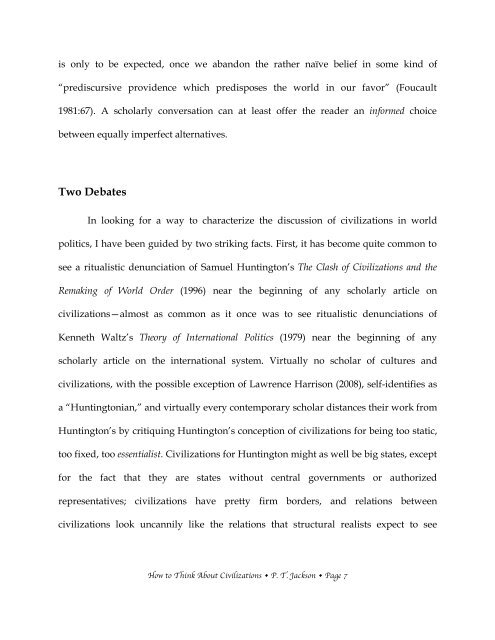How to Think About Civilizations - The Watson Institute for ...
How to Think About Civilizations - The Watson Institute for ...
How to Think About Civilizations - The Watson Institute for ...
Create successful ePaper yourself
Turn your PDF publications into a flip-book with our unique Google optimized e-Paper software.
is only <strong>to</strong> be expected, once we abandon the rather naïve belief in some kind of<br />
“prediscursive providence which predisposes the world in our favor” (Foucault<br />
1981:67). A scholarly conversation can at least offer the reader an in<strong>for</strong>med choice<br />
between equally imperfect alternatives.<br />
Two Debates<br />
In looking <strong>for</strong> a way <strong>to</strong> characterize the discussion of civilizations in world<br />
politics, I have been guided by two striking facts. First, it has become quite common <strong>to</strong><br />
see a ritualistic denunciation of Samuel Hunting<strong>to</strong>n’s <strong>The</strong> Clash of <strong>Civilizations</strong> and the<br />
Remaking of World Order (1996) near the beginning of any scholarly article on<br />
civilizations—almost as common as it once was <strong>to</strong> see ritualistic denunciations of<br />
Kenneth Waltz’s <strong>The</strong>ory of International Politics (1979) near the beginning of any<br />
scholarly article on the international system. Virtually no scholar of cultures and<br />
civilizations, with the possible exception of Lawrence Harrison (2008), self-identifies as<br />
a “Hunting<strong>to</strong>nian,” and virtually every contemporary scholar distances their work from<br />
Hunting<strong>to</strong>n’s by critiquing Hunting<strong>to</strong>n’s conception of civilizations <strong>for</strong> being <strong>to</strong>o static,<br />
<strong>to</strong>o fixed, <strong>to</strong>o essentialist. <strong>Civilizations</strong> <strong>for</strong> Hunting<strong>to</strong>n might as well be big states, except<br />
<strong>for</strong> the fact that they are states without central governments or authorized<br />
representatives; civilizations have pretty firm borders, and relations between<br />
civilizations look uncannily like the relations that structural realists expect <strong>to</strong> see<br />
<strong>How</strong> <strong>to</strong> <strong>Think</strong> <strong>About</strong> <strong>Civilizations</strong> • P. T. Jackson • Page 7
















